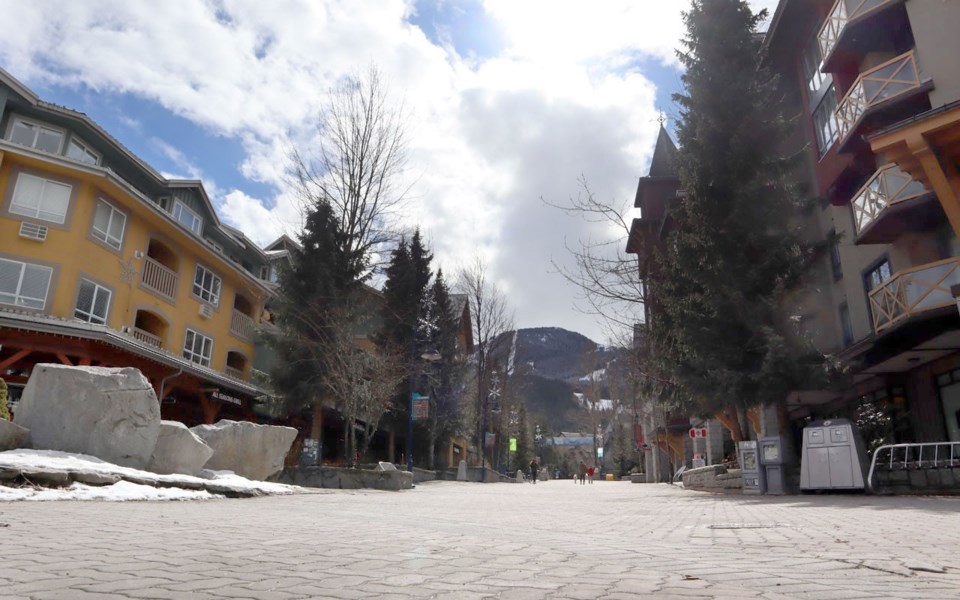This week, it really feels like the financial implications of the COVID-19 pandemic are settling at the front of our consciousness.
Obviously, we have all observed it with the resort emptying after the mid-March closure of both Whistler and Blackcomb mountains. But somehow, it was as if we were in a holding pattern, waiting to be told when things could reopen and how long we had to keep our stiff upper lip in place.
The reality is it could be weeks or even months longer, and if we see a resurgence of the pandemic during next winter's flu season with no vaccine in place, well... it hardly feels bearable to imagine what that will mean.
With snow melting off the trails, we are all giving our bikes a spring tune-up (though sticking to valley trails so as not to end up at the healthcare centre with injuries) and looking fondly at the downhill bike park trails.
But can we even open the bike park if we are still dealing with endemic coronavirus here? Let's remember that the bike park is responsible for a large percentage of the patients the Whistler Health Care Centre deals with.
Everyone is going to have to be creative to survive this. Small business does have some tools it can access now through federal and provincial programs, but there has to be a realization that this is simply not enough. You don't need an economics degree to understand that small businesses and their landlords are not going to come through this unscathed. Some partnerships are going to have to be forged in Whistler if landlords want to have occupants at all. Surely some rent is better than nothing?
And our amazing community groups are threatened as well. Of course, they understand that things can't go on as they were when it comes to funding support from local government, so we must move into a time when we are focusing what we have on what we need most. Keep in mind that our largest organization offering social supports is the Whistler Community Services Society (WCSS), which runs the food bank and much more—and it has lost its main source of revenue in the Re-Build It and Re-Use-It centres.
These amazing social enterprises generated total revenues of $1.67 million in 2019 and after expenses, there was about $671,000 for programs and so on. That revenue is gone for now at a time when it is needed the most. Those behind the scenes are leaving no stone unturned in addressing where to get grant money or other funding, but it's tough out there. We are competing against the entire country—what a situation to be in.
The Resort Municipality of Whistler (RMOW) is working on funding ideas to help WCSS but let's be clear—more funding for this organization means another important community group will have to do without.
Apart from the announcement a couple of weeks ago that the RMOW is temporarily laying off all casual and auxiliary employees (about 200 people)—which came into effect this Monday—we have had little information about what local government's financial plan is. We know some costs are down—for example, they are not operating the Meadow Park Sports Centre, nor the family activities at Olympic Plaza and so on. But by the same token, no fees are coming in from these things and, of course, other income sources are down too, such as pay parking.
What will get cut? Capital projects, staff housing, parks and rec, the festival program? Nothing will be sacred, I fear, as we deal with the fallout of COVID-19.
At least we are not Toronto, which is projecting a budget shortfall of more than $780 million across 12 weeks (assuming no one defaults on their taxes), or Vancouver, which says it is at risk of going bankrupt. A Research Co. poll commissioned by Vancouver's mayor found that a quarter of all property owners would not be able to pay more than half their property tax owed in 2020 and that six per cent were not expecting to pay anything at all. I would imagine the situation would be much worse here in Whistler as tourism is totally halted. Most people have little to no income coming in.
Cities and municipalities are calling on all levels of governments to fund them through this, and I would argue that with Whistler generating $1.37 million a day in tourism revenues pre-pandemic, we should have no problem putting our hand out to get a little help after giving so much to all levels of government for so long.
But can our local government do more to help residents? I hesitate to point to a U.S. example, but according to the Aspen Times, Aspen council recently voted to take money from various city funds to the tune of US$6 million to help people.
"The money will cover everything from rent and mortgage relief for local workers and residents to child care subsidies for working families to possible bridge loans or grants to Aspen businesses, along with costs associated with disease testing and personal protective equipment for health care workers," said the Times.
The money has to be paid back to those funds, but at least money is helping people right now who need it. Interesting.




